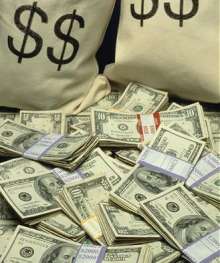 A firebrand preacher once described as Osama bin Ladens right-hand man in Europe is due to be freed within days after being granted bail by an immigration tribunal.
A firebrand preacher once described as Osama bin Ladens right-hand man in Europe is due to be freed within days after being granted bail by an immigration tribunal.So is England officially doomed yet, or what?
Abu Qatada, who last month defeated the Governments efforts to deport him to Jordan on terror charges, will be subject to a 22-hour curfew when he is released from Long Lartin high-security prison.
Ooooooh. A curfew...
Jacqui Smith, the Home Secretary, said she was extremely disappointed at the decision and promised all steps necessary to protect the public.
Some of the bail money is thought to have been put up by Norman Kember, the Christian peace worker who was held hostage in Baghdad for four months from November 2005 by a group of insurgents. Qatada had made a video appeal for his release.
| Stockholm syndrome ... |
The rulings mean that not a single international terrorist has been forcibly removed from this country. Nearly three years after the 7/7 attacks, the only Islamic extremists to depart are eight Algerians who left voluntarily.
Qatada 45, has been convicted in his absence in Jordan of involvement with terror attacks in 1998 and of plotting to plant bombs at the Millennium. The radical cleric once called on British Muslims to martyr themselves, and tapes of his sermons were found in a flat in Germany used by some of the September 11 hijackers.
Mrs Smith said: Public safety is our main priority and we will take all steps necessary to protect the public. We will ensure that necessary steps are taken to ensure the safety of the public. I am already seeking to appeal the Court of Appeals decision that it is not safe to deport Qatada and we will continue with deportation action with this and the other Jordanian cases.
Qatada could be freed within days and it is thought he will return to his family, who are understood to be living in Acton, West London. Once he has been released, the Jordanian father-of-five, can expect to receive £1,000 a month in benefit payments. The taxpayer will also face a bill of tens of thousands of pounds to keep the cleric under 24-hour watch.
David Davis, the Shadow Home Secretary, said: This whole situation totally undermines the Governments assurances that memoranda of understanding are the solution to deporting terror suspects. The Government should at last answer our calls to focus on prevention and prosecution rather than just trying to deport these individuals once they are here.
Anejem Choudary, a former senior member of extreme Muslim group Al-Muhajiroun and the
When Qatada was arrested by anti-terrorism police officers in February 2001, he had £170,000 cash in his possession, including £805 in an envelope marked For the Mujahedin in Chechnya.
However he went on the run in December 2001 when new laws were brought in that allowed terror suspects to be detained without charge or trial. Qatada became one of Britains most wanted men. Over six feet tall and weighing more than 20 stone, he was an unlikely fugitive but he avoided capture for 10 months. Qatada, whose real name is Omar Mahmoud Mohammed Othman, was finally arrested in an armed raid on a council house in south London in October 2002 and held in Belmarsh prison in south east London.

 Deep inside the heart of the Green Zone, the heavily fortified administrative compound in Baghdad, lies one of the most carefully guarded secrets of the war in Iraq.
Deep inside the heart of the Green Zone, the heavily fortified administrative compound in Baghdad, lies one of the most carefully guarded secrets of the war in Iraq. 
 The three peace activists freed by an SAS-led coalition force after being held hostage in Iraq for four months refused to co-operate fully with an intelligence unit sent to debrief them, a security source claimed yesterday. The claim has infuriated those searching for other hostages.
The three peace activists freed by an SAS-led coalition force after being held hostage in Iraq for four months refused to co-operate fully with an intelligence unit sent to debrief them, a security source claimed yesterday. The claim has infuriated those searching for other hostages. A second car bomb hit a market area outside a Shia Muslim mosque in the mostly mixed Shia-Sunni neighbourhood of Shurta in southwest Baghdad. At least six people were killed and more than 20 wounded, many of them children, police said. Roadside bombs targeting police patrols killed four others two policemen and two bystanders in Baghdad and at least one policeman in Iskandariyah. Police said dozens were wounded. Another two policemen were killed and two were wounded when gunmen ambushed their convoy in north Baghdad, an attack that police said was an aborted attempt to free detainees who were being transferred to the northern city of Mosul.
A second car bomb hit a market area outside a Shia Muslim mosque in the mostly mixed Shia-Sunni neighbourhood of Shurta in southwest Baghdad. At least six people were killed and more than 20 wounded, many of them children, police said. Roadside bombs targeting police patrols killed four others two policemen and two bystanders in Baghdad and at least one policeman in Iskandariyah. Police said dozens were wounded. Another two policemen were killed and two were wounded when gunmen ambushed their convoy in north Baghdad, an attack that police said was an aborted attempt to free detainees who were being transferred to the northern city of Mosul.